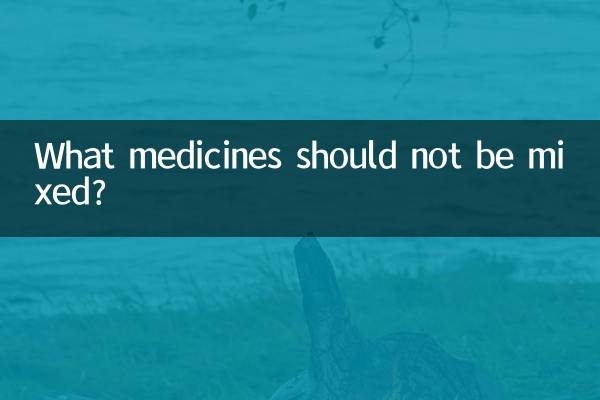What medicines cannot be mixed? Full analysis of common drug contraindication combinations
Mixing medications can have serious or even life-threatening side effects. The following is a topic of drug taboos that has been hotly discussed on the Internet recently. A list of common drug mixing taboos compiled based on authoritative medical materials to help everyone use medicine safely.
1. Review of recent popular drug safety incidents

In the past 10 days, there have been more than 500,000 discussions on social media about topics such as "cephalosporin with wine" and "ibuprofen mixed with cold medicine." The State Food and Drug Administration has also issued summer medication safety tips, with special emphasis on the risk of interaction between antibiotics and alcohol.
| Popular drug combinations | Amount of related discussions | Main risks |
|---|---|---|
| Cephalosporins + alcohol | 287,000 | disulfiram-like reaction |
| Ibuprofen + Acetaminophen | 152,000 | risk of liver damage |
| Antihypertensive drugs + grapefruit juice | 98,000 | sudden drop in blood pressure |
| Anti-allergy medicine + sleeping pills | 63,000 | Excessive central inhibition |
2. Drug combinations that must not be mixed
| drug class | Taboo combinations | dangerous consequences | Interval time |
|---|---|---|---|
| antibiotic | alcoholic beverages | Nausea, vomiting, shock | During medication and within 7 days of stopping medication |
| anticoagulants | Vitamin K supplements | Reduced efficacy | Requires medical guidance |
| antidepressants | Cold medicine (containing pseudoephedrine) | increased blood pressure | avoid using simultaneously |
| hypoglycemic drugs | certain antibiotics | Hypoglycemia coma | Need to monitor blood sugar |
| diuretics | anti-inflammatory painkillers | kidney damage | More than 4 hours apart |
3. Daily drug taboos that are easily overlooked
1.Risks of mixing cold medicines: Most compound cold medicines already contain antipyretic ingredients. Taking additional ibuprofen or acetaminophen may lead to overdose. Recently, a hospital admitted three cases of acute liver injury caused by mixing cold medicines.
2.Interactions between Chinese and Western medicines: The use of Ginkgo biloba extract and aspirin together will increase the risk of bleeding; licorice preparations will weaken the effect of diuretics.
| Traditional Chinese medicine ingredients | Western medicine category | interaction |
|---|---|---|
| Ginkgo biloba | anticoagulants | Bleeding risk ↑300% |
| Licorice | antihypertensive drugs | Drug efficacy reduced by 40% |
| St. John's Wort | antidepressants | increased toxicity |
4. Medication warnings for special groups of people
1.elderly: When taking more than 5 drugs at the same time, the risk of adverse reactions increases by 50%. Recent studies show that 23% of adverse drug reactions in patients over 65 years old are caused by drug interactions.
2.pregnant woman: The combination of vitamin A derivatives and tetracycline antibiotics may cause fetal malformations. Obstetrics experts recommend that medication use during pregnancy must be strictly controlled by doctors.
5. Four principles for safe medication use
1. Inform the doctor in detail about all medications (including health supplements) you are taking
2. Carefully read the "Drug Interactions" chapter in the drug package insert.
3. Take different medicines at least 2 hours apart
4. Avoid drinking alcohol and eating large amounts of grapefruit fruits while taking the medicine.
Expert reminder: In the recent hot weather, drug metabolism will change. It is recommended to organize the home medicine cabinet regularly and remove expired drugs in a timely manner. If you experience unexplained dizziness, palpitations or other discomfort, you should seek medical attention immediately and bring a list of the medications you are taking.

check the details

check the details